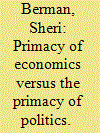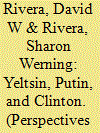|
|
|
Sort Order |
|
|
|
Items / Page
|
|
|
|
|
|
|
| Srl | Item |
| 1 |
ID:
090844


|
|
|
|
|
| Publication |
2009.
|
| Summary/Abstract |
Rising income inequality has been a defining trend of the past generation, yet we know little about its impact on social policy formation. We evaluate two dominant views about public opinion on rising inequality: that Americans do not care much about inequality of outcomes, and that a rise in inequality will lead to an increase in demand for government redistribution. Using time series data on views about income inequality and social policy preferences in the 1980s and 1990s from the General Social Survey, we find little support for these views. Instead, Americans do tend to object to inequality and increasingly believe government should act to redress it, but not via traditional redistributive programs. We examine several alternative possibilities and provide a broad analytical framework for reinterpreting social policy preferences in the era of rising inequality. Our evidence suggests that Americans may be unsure or uninformed about how to address rising inequality and thus swayed by contemporaneous debates. However, we also find that Americans favor expanding education spending in response to their increasing concerns about inequality. This suggests that equal opportunity may be more germane than income redistribution to our understanding of the politics of inequality.
|
|
|
|
|
|
|
|
|
|
|
|
|
|
|
|
| 2 |
ID:
090852


|
|
|
|
|
| Publication |
2009.
|
| Summary/Abstract |
We examine activities of and between minority advocacy groups in the U.S., particularly similarities and differences in positions of Blacks and Latinos in their efforts to influence national-level policies. Findings highlight several points. Analysis of Congressional scorecard data indicates only modest overlap among the issues identified by the minority advocacy groups, though there is complete "congruence" on the issues that are identified by both groups. The highest degree of "independence" of the activities examined occurs in Congressional testimony. Regarding legal advocacy, analysis of amicus curiae briefs further affirms the general finding that there is little if any outright competition between Black and Latino advocacy groups. There appears to be considerable "tacit non-cooperation" which varies by policy-type and between these national institutions.
|
|
|
|
|
|
|
|
|
|
|
|
|
|
|
|
| 3 |
ID:
090859


|
|
|
|
|
| Publication |
2009.
|
| Summary/Abstract |
Presidents are rightly held responsible for managing the national economy-they exercise substantial discretion over fiscal policy and have the potential for informally influencing monetary policy. At the same time, presidential accomplishments are circumscribed by market forces and institutions at home and overseas, and the complexities of fragmented authority and external constraints make judging performance difficult. I draw on the literature on economic policymaking and on the presidency to explicate a set of criteria for comparing presidential economic policy leadership, construct quantitative indicators of each dimension, and display the results of comparative analyses covering the second half of the twentieth century. The four criteria view presidents from three different vantage points: the separation of powers, focusing on presidents' success at gaining congressional approval for an economic agenda; the public, based on an original compilation of survey data tracking the electorate's evaluation; and the economy, tracing how presidents' policies affect overall prosperity and the distribution of income. Combining information about how crucial audiences have perceived and responded to presidential initiatives, with outcomes in the economy, this approach emphasizes comparison, and thus complements the qualitative depth of narrative approaches.
|
|
|
|
|
|
|
|
|
|
|
|
|
|
|
|
| 4 |
ID:
090865


|
|
|
|
|
| Publication |
2009.
|
| Summary/Abstract |
Many analyses of U.S. foreign policy after September 11 have rested upon readings of the U.S. as a traditional imperialist power. In so doing, the constructions of Al Qaeda as a decentralized corporation and a virtual network are often ignored. Corporate and network constructions place less stress on conventional threats to the nation-state and instead portray terrorism in distinctively post-Fordist terms. This in turn helps explain the short-lived and partial patriotic responses to the terrorist attacks, as well as the contradictory place of race in portrayals of the threat facing the U.S. Together these discourses point to new ways of thinking about U.S. nationalism and terrorism in the twenty-first century.
|
|
|
|
|
|
|
|
|
|
|
|
|
|
|
|
| 5 |
ID:
090855


|
|
|
|
|
| Publication |
2009.
|
| Summary/Abstract |
Although female candidates have achieved parity on some dimensions, political institutions remain deeply gendered in how they structure the parameters of electoral competition. We rely on a new data set of gubernatorial races from the 1990s to address the theoretical and empirical challenges created by the interaction of gender, media content, and electoral institutions. Based on an analysis of 1,365 newspaper articles for 27 contests in which a woman held a major party nomination, we uncover evidence of continuing bias in media coverage. Yet significant coefficients on candidate sex tell only part of the story. Gendered contextual factors linked to the contest and state in which candidates compete, as well as the newspapers that cover their races, also affect women's experiences on the campaign trail. The major finding, however, is the presence of a powerful baseline effect favoring male candidates that is deeply embedded in U.S. politics. All else equal, women gubernatorial candidates suffer a substantial vote deficit that results from non-observable influences. The results support the emerging consensus among feminist theorists that greater focus on the political context is likely to produce bigger scholarly payoffs than is continued attention to observable differences between male and female candidates.
|
|
|
|
|
|
|
|
|
|
|
|
|
|
|
|
| 6 |
ID:
090863


|
|
|
|
|
| Publication |
2009.
|
| Summary/Abstract |
The current economic crisis has once again bought debates about capitalism and globalization to the forefront of the political agenda. Until very recently almost everyone seemed to be convinced that the world was at the dawn of a new era. Yet, the issue at the heart of globalization debates-whether political forces can dominate economic ones or must bow before them-is not new at all. I show that many of the great ideological and political battles of the last century were fought over precisely this ground, and argue that because we have forgotten or misunderstood these earlier debates our current discourse is thin and impoverished. To understand where we are and where we are going, we have to first step back and look closely at where we have been.
|
|
|
|
|
|
|
|
|
|
|
|
|
|
|
|
| 7 |
ID:
090847


|
|
|
|
|
| Publication |
2009.
|
| Summary/Abstract |
The teaching of evolution in public schools has been a central element in the nation's "culture wars" since the 1920s and remains a contentious issue today. Content standards for the teaching of biology have been flashpoints for conflict, with well publicized battles occurring in state governments, in federal courts, and in local school districts. We show that a full understanding of evolution politics at the state level must simultaneously account for three important features. First, cultural politics typically includes an important role for public opinion. Second, scientists and their professional organizations have actively sought a monopoly on defining what is and is not science by marginalizing their uncredentialled opponents and by erecting boundaries that buffer science policy from the influence of politics and public opinion. Third, in the American federal system courts rarely settle cultural issues but merely narrow the space within which politics can operate. In accounting for these features, we explain why court victories for science have had only limited impacts and provide a model for understanding other issues-such as sex education, stem cell research, and global warming-in which moral and ideological arguments may conflict with scientific consensus.
|
|
|
|
|
|
|
|
|
|
|
|
|
|
|
|
| 8 |
ID:
090868


|
|
|
|
|
| Publication |
2009.
|
| Summary/Abstract |
Immediately after coming to power, the Clinton administration declared the consolidation of market and democratic institutions in Russia to be a vital American interest. The administration's central tactic for promoting this outcome was to help Boris Yeltsin remain in power. In a major assault on Clinton's historical legacy, much of the scholarly community maintains that U.S. policy was fundamentally flawed, both morally and strategically. In the view of these analysts, post-Soviet Russia's founding president was an autocratic leader who derailed the country's progress toward democracy. However, this body of research focuses exclusively on the Russian Federation and fails to utilize comparative referents. In contrast, we analyze the experiences of the full population of post-communist states of Eastern Europe and Eurasia from 1991 to the present. Whether examined in cross-national or longitudinal perspective, we find that Russian democracy under Yeltsin was, relatively speaking, a success. We conclude that the Clinton administration's policy of support for Yeltsin both served various American foreign policy interests and strengthened the prospects for democratic consolidation in Russia, thereby fulfilling the dictates of both real- and idealpolitik. In addition, the relative success of Russia's democratization in the 1990s, the reversal of that pattern in this decade, and the magnitude of the transformation of the polity under Putin all demonstrate the pivotal role played by presidential leadership in Russia's transition
|
|
|
|
|
|
|
|
|
|
|
|
|
|
|
|
|
|
|
|
|